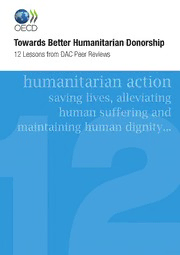Table Of ContentOECD
Towards Better Humanitarian Donorship
12 Lessonsfrom DACPeerReviews
humanitarian action
saving lives, alleviating
human suffering and
maintaining human dignity...
Towards Better Humanitarian Donorship
12 Lessonsfrom DACPeerReviews
®))
OECD
OrganisationforEconomicCo-operationandDevelopment
TheOECDisauniqueforumwheregovernmentsworktogethertoaddresstheeconomic,sociaiand
environmentaichallengesofglobalisation.TheOECDisalsoattheforefrontofeffortstounderstand
andtohelpgovernmentsrespondtonewdevelopmentsandconcerns,suchascorporategovernance,
theinformationeconomyandthechallengesofanageingpopulation.TheOrganisationprovidesa
settingwheregovernmentscancomparepolicyexperiences,seekanswerstocommonproblems,
identifygoodpracticeandworktoco-ordinatedomesticandinternationalpolicies.
TheOECDmembercountriesare:Australia,Austria,Belgium,Canada,Chile,theCzechRepublic,
Denmark,Estonia,Finland,France,Germany,Greece,Hungary,Iceland,Ireland,Israel,Italy,Japan,
Korea,Luxembourg,Mexico,theNetherlands,NewZealand,Norway,Poland,Portugal,theSlovak
Republic,Slovenia,Spain,Sweden,Switzerland,Turkey,theUnitedKingdomandtheUnitedStates.The
EuropeanUniontakespartintheworkoftheOECD.
ThisworkispublishedontheresponsibilityoftheSecretary-GeneraloftheOECD.Theopinionsexpressed
andargumentsemployedhereindonotnecessarilyreflecttheofficialviewsoftheOrganisationorofthe
governmentsofitsmembercountries.
Thisdocumentandanymapincludedhereinarewithoutprejudicetothestatusoforsovereigntyover
anyterritory,tothedelimitationofinternationalfrontiersandboundariesandtothenameofanyterritory,
cityorarea.
©OECD2012
Youcancopy,downloadorprintOECDcontentforyourownuse,andyoucanincludeexcerptsfromOECD
publications,databasesandmultimediaproductsinyourowndocuments,presentations,blogs,websites
andteachingmaterials,providedthatsuitableacknowledgmentofOECDassourceandcopyrightowner
isgiven.Allrequestsforcommercialuseandtranslationrightsshouldbesubmittedtorights@oecd.org.
399521
TABLEOFCONTENTS
Preface 5
Introduction 7
Thestrategicframework 9
Lesson1:Provideclearstrategicvision 9
Lesson2:Promoterecoveryandresilience 1
Lesson3:Reducedisasterrisks 1
Lesson4:Prioritiseparticipation 17
Deliveringeffectivefunding 1
Lesson5:Matchyourvisionwithyourmoney 1
Lesson6:Decidehowtodecide 21
Lesson7:Buildstrongpartnerships 25
Lesson8:Developrapidresponsemechanisms 29
Organisationfitforapurpose 33
Lesson9:Co-ordinateacrossgovernment 33
Lesson10:Worktoclarifytheroleoffhemilifary 37
Lesson11:Investinyourstaff 41
Learningandaccountability 43
Lesson12:Demonstratevalueformoneyandpromotelearning 43
Notes 47
References 49
Annex:PrinciplesandGoodPracticeofHumanitarianDonorship 50
Boxes
Box1.OverviewofDenmark'shumanitarianstrategy2010-15 10
Box2.Switzerland’scash-basedrecoveryprogrammes 1
Box3.Germany'sapproachtodisasterriskreduction 1
Box4.TheUnitedKingdom’spolicyonhumanitarianaidvolumes 20
Box5.TheEuropeanCommunityHumanitarianOffice's
GlobalNeedsAssessmentandForgottenCrisesAssessmenttools 23
Box6.Luxembourg’sapproachtopartnership 27
Box7.Sweden'srapidresponsemechanism 31
Box8.Effectivecross-governmentco-ordinationinCanada 35
Box9.Australia'sapproachtocivil-militaryrelations 39
Box10.TheUnitedStates’strongstaffbase 42
Box11.France'shumanitarianevaluationframework 45
ThePrinciplesandPractices
ofGoodHumanitarian
Donorship... definetheobjectives
ofhumanitarianactionas:to
savelives, alleviatesufferingand
maintainhumandignityduring
andin theaftermathofcrises, as
wellastopreventand
strengthenpreparedness.
.
PREFACE
PeerreviewsofOECDDevelopmentAssistanceCommittee(DAC)membersarebased
onthedualprinciplesofpeerpressureandpeerlearning.Thereviewsaretheonly
internationalprocesstoregularlyexaminekeybilateraldevelopmentco-operation
systemsandofferconstructivecommentaryfortheirreform.Indoingso,peerreviewsconstitute
ayardstickagainstwhichtheDACcanmeasuretheinfluence-orlackofit-ofitsgoodpractice
princ2i.plesondonorbehaviour,bothinthefieldandatheadquarters.
Th3e.ultimateaimsofDACpeerreviewsareto:
1 helpimprovethequalityandquantityofaid
providecredibleanalysesbasedoncommonprinciplesthatcanbe
usedbybothDECDcountriesandthewiderinternationalcommunity
enabledonorstoshareexperiences,identifygoodpracticesandimprove
co-ordination.
Aspartofeachreview,theDACaimstoholddonorsaccountabletothePrinciplesandPractices
ofGoodHumanitarianDonorship(GHD),initiallyendorsedbyagroupofdonorsinStockholmin
June2003(seeAnnex),TheseGHDprinciplesseektoenhancethecoherenceandeffectiveness
ofdonoraction,aswellasimproveaccountability,co-ordination,learningandevaluation.The
principlesdefinetheobjectivesofhumanitarianactionas:tosavelives,alleviatesufferingand
maintainhumandignityduringandintheaftermathofcrises,aswellastopreventandstrengthen
preparednessfortheoccurrenceofsuchsituations(GHDprinciple1,seeAnnex).
Notwodonorsarealike-legalenvironmentsandbusinessmodelsdiffer,politicalcontexts
andinterpretationsofnationalinterestchangeovertime,budgetvolumesgoupanddown,and
operationalchallengescontinue,Accordingly,donorsareimplementingtheGHDprinciplesin
differentways,dealingwithvariousrealitiesandbuildingonindividualcomparativeadvantage,to
deliverprincipledandeffectivehumanitarianfundingasbesttheycan,
Thispublicationoutlinesthe12mostimportanthumanitarianlessonsfromtheDACpeerreviews,
profilesexamplesofgooddonorbehaviourhighlightedinthepeerreviews,andsketchesoutthe
challengesdonorsstillfaceastheymovetowardsbetterhumanitariandonorship.Lessonsare
groupedunderthefollowingheadings:thestrategicframework;deliveringeffectivefunding;an
organisationfitforpurpose;andlearningandaccountability.
TOWARDSBETTERHUMANITARIANDONORSHIP;12LESSONSFROMDACPEERREVIEWS 5
ThispublicationwaspreparedbytheOECD’sHumanitarianAidAdvisor,RachelScott,drawing
ontheworkofherpredecessors,HenrikHammargrenandSteveDarvill.Valuablecomments
andfeedbackwereprovidedbyMichaelWardandMeganKennedy-Chouane.Australia,Canada,
Japan,NorwayandPolandprovidedmuch-neededoversightasmembersoftheeditorialboard.
The12lessonsseries,coveringarangeofissuesandtargetedatdevelopmentpolicy
professionals,hasbeendevelopedunderthedirectionandguidanceofKarenJorgensen,Head
oftheReview,EngagementandEvaluationDivisionoftheCECD'sDevelopmentCo-operation
Directorate.
INTRODUCTION
ByJ.BrianAtwood,ChairoftheDevelopmentAssistanceCommittee,OECD
Humanitarianaction-savingiives,aiieviatingsufferingandmaintaininghumandignityduring
andintheaftermathofcrises-remainsaclearpriorityforDACdonors,OverUSD11,2biliion
ofpublicfundsweredisbursedashumanitarianaidin2009^bythe24membersoftheOECD
DevelopmentAssistanceCommittee(DAC),representingneariy9%ofthetotaialiocationfor
officiaideveiopmentassistance(ODA).Volumesareimportant,ofcourse,butitisthequalityand
effectivenessofdevelopmentassistancethattheDACpeerreviewsseektoassessandimprove.
Indemandingcontexts,humanitariandonorsmustrespondtoawiderangeofchallenges
inordertomeettheneedsofthosesufferingfromcrisisanditsaftermath.Inrespondingto
thesehumanitarianchallenges,DACmembersarenowcommittedto:((throughdevelopment
assistance,preventingcrises,oratleastminimisingtheirrisktopeopleanddevelopment;ii)
throughhumanitarianassistance,torespondtocrises;andHi)usingamixofhumanitarian
anddevelopmentassistance,toachieveabettertransitionfromahumanitariansituationto
longer-termdevelopment.Thischallengebecomesgreaterwhenpartnersarecallingformore
timelyandpredictablefunding,andpushingforstrongerrelationshipsaccompaniedbyhigher
levelsofcorefunding.Taxpayersandpoliticianswantanincreasedfocusonvalueformoney
inaclimatewherestaffingcutbacksarelimitingmonitoringcapacity.Thereisclearlyaneedto
adoptnewandmorestrategicapproachestofunding-allowinghumanitarianstobetteraddress
rapidonsetemergencies,whilerespondingmoreappropriatelytothestructuralchallengesthat
prolongvulnerabilityinprotractedcrises.Inaddition,thereisalsothechallengeofdesigningsolid
humanitarianprogrammesthat,attheveryleast,donotunderminelonger-termrecovery-and
thisremainsproblematic.
Donorsarealsofacingincreasinginternalandexternalpressuretostretchtheirhumanitarian
budgetsbeyondthetraditionalhumanitarianimperative.Humanitarianteamsarenowbeing
pressedintocoveringthefullrangeofdisasterriskreductionactivities,andtotacklelonger-term
taskssuchaspost-disasterreconstruction,statebuildinganddeliveringpeacedividendsinfragile
statecontexts-clearlyareasthatarebeyondthescopeofmerelysavinglives.Donorsmustalso
learnhowtoworkbetteracrossgovernment,especiallywiththeirmilitarycounterparts-amajor
challengeinthenewsecurityenvironment.Thishasledtoaneedformoretransparentfunding
TOWARDSBETTERHUMANITARIANDONORSHIP;12LESSONSFROMDACPEERREVIEWS
allocationpoliciesandprocessesasproofthatdonorsareremainingtruetotheirhumanitarian
principiesofneutrality,impartiaiity,humanityandindependence.
Humanitariandonorshavehadtolearnandevolveastheyfaceeachofthesechallenges.The
DACpeerreviewshavenotedmanyareasofimprovementandinnovationasdonors-eachwith
theirownindividualrealityandcomparativeadvantage-seektoimplementtheprinciplesfor
GoodHumanitarianDonorshipasbesttheycan.Intheprocess,abroadsetof12lessons,anda
correspondingsetofgoodpractices,havecometolight,andtheseareoutlinedinthispublication.
Donorsarealsolearningthattherearesomeareas-supportingco-ordination,promoting
protectionandstandardisedreporting,forexample-whereindividualeffortsarenotenough,and
theymustworktogethertoachieveresults.TheGHDgroup’sworktowardsovercomingthese
challengeswillremainimportant,alongsidetheDAC'scontinuedsupportforeffortstopromote
betterhumanitariandonorship.
J.BrianAtwood
ChairoftheDevelopmentAssistanceCommittee,OECD
A
cross-governmentpolicy
and!orstrategyforhumanitarian
assistance... shouldbebasedonafocused
andrealisticvision thatwillallowatargeted
approachtofundingandsupportingits
humanitarianprogramme.

